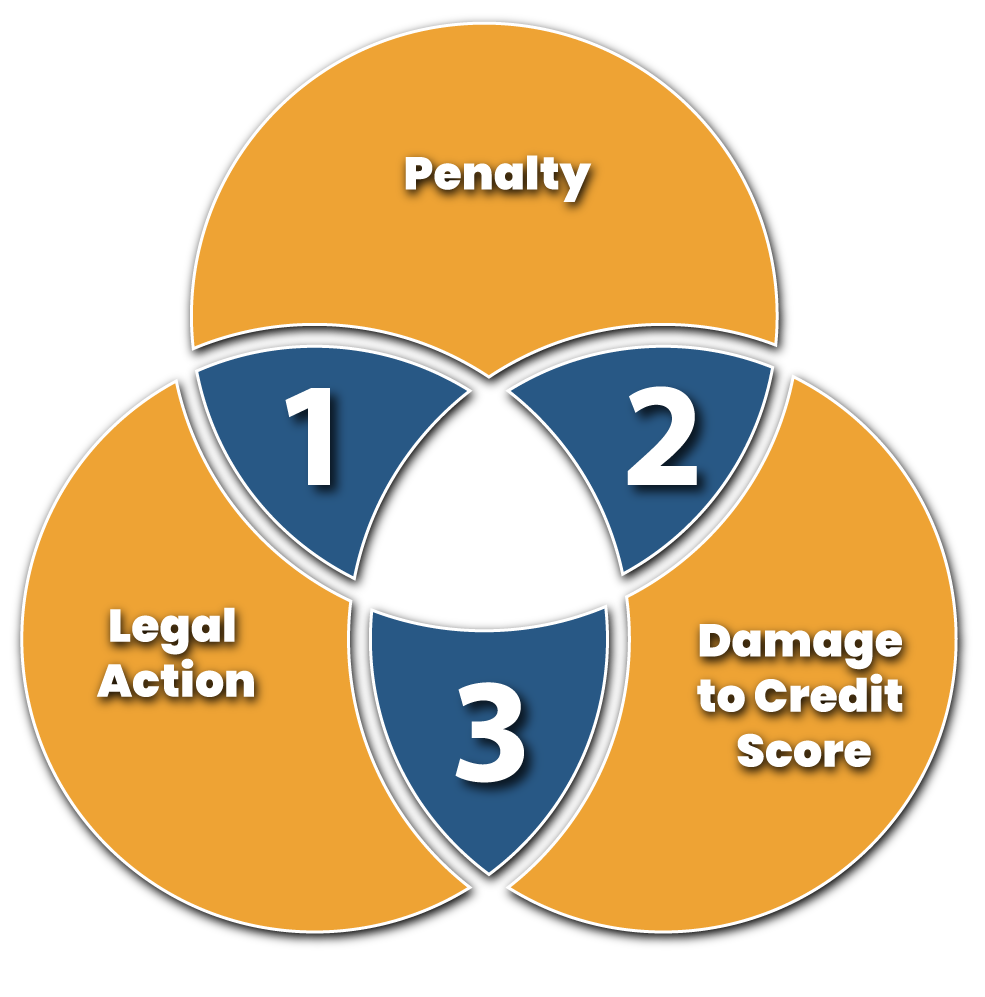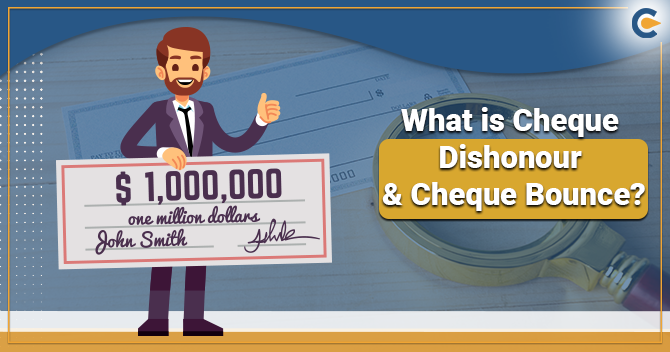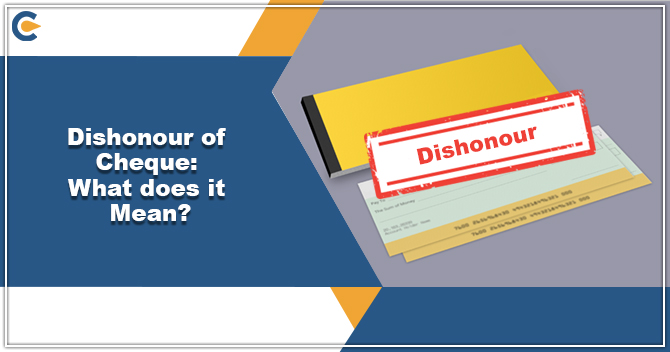A cheque is a way to transfer the money and promotes the transactions of the economy in cashless. With time the usage of the cheque has been increased. People have started to do cashless transaction instead of giving currencies.When the payee gets the mentioned amount by submitting the cheque before the bank, the bank has honoured it. If the bank returned the cheque unpaid it means the cheque dishonour by the bank.
Difference between Cheque Bounce & Cheque Dishonour
The concept of cheque Dishonour and cheque bounce is almost the same, but the only difference is that cheque Dishonour occurred due to distinctive signature, wrong date etc. But the cheque bounce occurred only due to insufficient funds in drawer’s account.
Although cheque bounce cases are common these days, cheque remains unpaid. If the drawer fails to make a new payment within 30 days of receiving the legal notice, the payee has the right to file a criminal complaint under section 138 of the Negotiable Instruments Act. However, the complaint must be lodged in the first-class magistrate’s court within the 30 days of the legal notice period
Prerequisites if the Cheque is Dishonoured or Bounced
- When a cheque is Dishonoured or bounced, the drawee bank immediately issues a ‘Cheque Return Memo’ to the payee’s banker mentioning the reason for non-payment. When a cheque is Dishonoured or bounced, the drawee bank immediately issues the ‘Check Return Memo’ to the payee bank by mentioning the reason for non-payment.
- After this, the payee bank will return the Dishonoured or bounced cheque along with the ‘Cheque Return Memo’ to the payee.
- The payee can resubmit the cheque on it within three months of the date if payee believes that it will be honoured in a second time.
- If the drawer fails to pay, the payee can initiate legal proceedings against the drawer.
- The payee can legally sue the drawer for cheque Dishonour or bounce only if the amount mentioned in the cheque is against the payment of a loan or any other liability of the defaulter.
- In case the cheque was given as a gift, for lending or unlawful purposes, then the payee cannot initiate legal proceedings against the drawer in such cases.
Read our article:What is the Legal Rights Available for Payee in Cheque Bounce Cases?
Grounds on which Cheque may be Dishonoured or Bounced
- No scribbling, overwriting, correction etc. is permitted on the cheque and if a cheque is found that way, it will be Dishonoured or bounced.
- In case the signature is missing, or the signature in the cheque does not match the with bank’s sample signature.
- In case the name of the payee is not mentioned on the cheque or not visible clearly.
- In case the amount mentioned in words and figures does not match with each other.
- In case the account number is not written clearly or missed.
- In case the drawer orders the bank to stop payment mentioned on the issued cheque
- If Court ordered drawee bank to stop payment on the provided cheque,
- In case the drawer has closed the account before submitting the cheque by the payee.
- In case the fund in the drawer bank account is insufficient to complete the payment of the cheque.
- In case the drawee bank receives the information regarding the death or lunacy or insolvency of the drawer.
- The drawer does not approve any alteration made on the cheque by giving his/her signature.
- In case the date is absent or miswritten, or the date is written three months before.
Consequences of Cheque Dishonour or Cheque Bounce
Below listed can be the consequences faced by the drawer or payee under the circumstances of cheque Dishonour or bounce


Penalty
In case a cheque is Dishonoured or bounced, their respective banks will charge the fine on both the drawer and the payee. If there is a Dishonoured cheque against the loan’s repayment, the person will have to pay additional payment charges.
Damage to Credit Score
Your credit history is negatively affected if your cheque Dishonoured or bounced activities are reported to the credit bureaus by financial institutions. Moneylenders will trust you to give financial aid if you have a good credit score as it is a good practice to keep your cheque from getting bounced. Your suitable payment activities will help you maintain good CIBIL scores and benefit you when you borrow money from any financial institution.
Legal Action
- Negotiable Instruments Act, 1881[1] applies to cases relating to cheque Dishonour or bounce. As per section 138 of the Act, cheque Dishonour or bounce is a criminal offence and punishable with fine or imprisonment up to 2 years or both.
- If the payee decides to initiate legal proceedings, the drawer should be provided with the chance to repay the amount to the payee immediately.
- To intimate the drawer about another chance, the payee requires sending notice within the 30 days of receiving of ‘cheque return memo’
- It should be mentioned in the notice that the cheque amount has to be paid to the payee within 15 days from the date of receipt of notice by the drawer.
- In case the drawer fails to make a new payment within 30 days of receipt of the notice, the payee has the right to file a criminal complaint under section 138 of the Negotiable Instruments Act.
- The complaint should be registered in a first-class magistrate’s court before the notice period’s expiry, i.e. within 30 days.
Conditions to Take Legal Action
- The case should be fall under the terms of section 138 of N.I Act, 1881
- The cheque should have been issued by the drawer on an account maintained by him.
- In case of cheque bounce, cheque should have been returned unpaid by the bank because of insufficient funds in the drawer’s account.
- The cheque must be provided towards discharge of a debt or legal liability.
- In case the drawer does not clear the payment to payee within 15 days from the day of receiving the notice, then he commits a criminal offence which is punishable u/s 138 of the N.I Act, 1881
Punishment under Cheque Dishonour or Cheque Bounce Case
- On the complaint’s receipt, along with an affidavit and the relevant paper mark, the court will issue summons to accused and hear the case accordingly.
- The accused may be punished by fines, which may double the amount mentioned on cheque or imprisonment for a term that may extend to two years or both.
- The drawee also has the right to stop the cheque book facility and close the account for repeat offences relating to cheque Dishonour or bounce.
Concluding Remark
Today in growing Speedy and fast world, we all keep our transactions through online and offline mode. Generally, we issue a cheque to another person in the form of order to pay or take the amount from the bank. Sometimes we are unpaid, and the issued cheque gets bounced.
Payee sends notice to the drawer to meet or release the cheque amount within a specified period. In case we find no affirmative response from their end, we could proceed legally and penalize the wrongdoer for such acts. Kindly associate with the Corpbiz expert to know more about the What Payee Should Do under the Circumstances of Cheque Dishonour or Bounce.
Read our article:How to Send a Legal Notice for Cheque Bounce?










